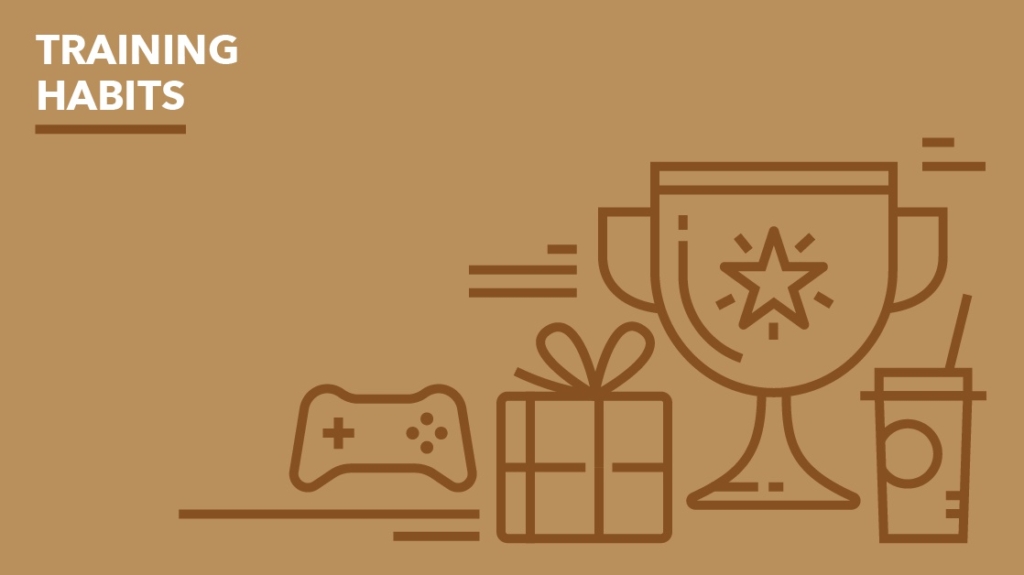Using Reward to Boost Your Training Habits

"We are what we repeatedly do; excellence then is not an act, but a habit." -Aristotle
In order to demonstrate how reward can be used to boost your training habits, we conducted a super-scientific and totally legitimate study of people who are using CBT Nuggets training, and who happen to work at CBT Nuggets. Clearly, very scientific.
The results surprised us more than just a little bit, but we're pretty excited about how we (and you!) can apply what we learned.
The Results
Of those surveyed, less than 45% reward themselves when they achieve a training goal.
Of those who do reward themselves, they are evenly split with 25% using rewards on a weekly, monthly, semiannual, or "other" basis. No one reported using reward on a daily basis.
The Surprises
We expected that more people would be using rewards in their training experiences. In fact, one might argue that we were even hoping for it!
We expected that more people would use some kind of reward on a daily basis.
What It All Means As we work to create stronger training habits, we can (and should!) be using rewards in better and more consistent ways. We expected to find that many learners use rewards on a daily basis, and were surprised when not a single person surveyed reported doing so.
We could interpret this finding in a couple of different ways: We could see this as learners not using rewards, or more likely, that they aren't aware of the rewards they are using.
Most of us use some kind of reward when training, even if we're only aware of the reward on a subconscious level.
Tea Time = Training Time
One of our team members here at CBT Nuggets talks about his training habit including hot tea with lots of sugar in it when he sits down to train, every afternoon at 1. He is so consistent in drinking sugary tea while he trains, that now when he gets a craving for tea and sugar, his brain also expects that it's time to train. He has successfully married his training to a time (cue) and reward (tea with sugar), which has resulted in the development of a true habit. It is now totally automatic for him at 1 p.m. to stop what he's doing, make some tea, and go train.
This is exactly the type of reward an actual research study refers to as the Habit Loop.
Taking a Break = Training Time
It may well be that you are so comfortable with your training routine that you're not even aware of the rewards you are using. Some learners may look at the 30 minutes they spend training as a break from the busy work day, which means the reward is a little peace and quiet in an otherwise hectic day. Others may so deeply value the new knowledge and skills that they develop that the training itself is the reward!
Small and simple rewards can be powerful motivators and work particularly well when working to build a new habit, like training for your CCNA, CEH, or MCSA.
Applying The Lesson The connection between reward and your training habits is very real. And our very scientific research leads us to believe that many of our learners can be better using reward to create a training habit. So, how can we apply what we learned from our very robust survey?
1. Break your training down into small, achievable goals. Rather than rewarding yourself only when you pass your certification exam, reward yourself every time you train! Even if it is just a cup of tea with sugar in it, connect a small but desirable reward to your daily training experience. Consider using food or drink as a reward, but the reward could just as meaningfully be a walk outside, a 10-minute break to play on social media, watch a TV show that you enjoy, do some reading just for fun, spend time with friends or family, etc.
2. Specifically identify your reward(s). If you are conscious of the reward, you can better appreciate the reward! Intentionally acknowledge the reward each time you earn it!
3. Use your reward in conjunction with a timely cue. If you connect your reward to your training and a specific time for training, you are well on your way to developing a habit of training. Choose a time of day when you are at your best! Here's a tip: that time is rarely at the end of a long day at work! For most of us, we are at our best first thing in the morning, or in the evening after we've had a chance to recharge after a long day at work.
4. Consistency is key. Whatever reward you choose, whatever time works best for you, be consistent! Researchers found that it takes 66 days on average to create a new habit. And consistency is critical in the first couple of months. Be strategic about starting your training habit. If you know you're going on vacation in a few weeks, definitely do some training, but keep in mind that the interruption to your training and reward routine will disrupt the habit-forming process.
Training is hard. If it was easy, everyone would be doing it all the time. The fact that it's hard makes it worth doing! Take some time to evaluate what you find rewarding in your training experience, and then leverage that information to create a habit of training.
delivered to your inbox.
By submitting this form you agree to receive marketing emails from CBT Nuggets and that you have read, understood and are able to consent to our privacy policy.